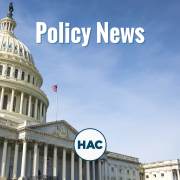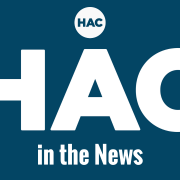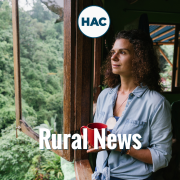HAC Launches USDA-backed Placemaking Program
Contact: Hillary Presecan, hillary@ruralhome.org
(340) 227-1978
10 communities selected for cohort
Washington, DC, February 10, 2023 –The Housing Assistance Council (HAC) announced the ten communities selected for our Rural Placemaking Innovation Challenge (RPIC) cohort. RPIC is a USDA program that funds planning support, technical assistance, and training to encourage placemaking activities in rural communities. The ten communities selected to be part of HAC’s cohort will receive 15 months of capacity building support, connection to a peer cohort, and seed grant funding. In May 2023, the cohort will gather in Newbern, Alabama, for hands-on rural placemaking training hosted by Rural Studio® an off-campus design-build program of Auburn University’s School of Architecture, Planning and Landscape Architecture. Rural Studio® is a national leader in creating rural affordable housing along with the vital systems that create strong rural communities.
“Placemaking is a thread that binds so many local efforts to improve rural communities, from affordable housing to broadband to arts and culture,” said Shonterria Charleston, HAC’s Director of Training and Technical Assistance. “Through RPIC, we will assess local needs, create a relevant curriculum, and provide coaching and capacity building as each community takes on a local placemaking challenge.” Charleston noted that building on local assets, even in distressed communities, is a hallmark of placemaking.
A summary of the cohort and highlights from each selected community are below.
Summary
HAC’s Rural Placemaking Innovation Challenge (RPIC) cohort is a USDA funded initiative that supports 10 rural and tribal economically distressed communities largely in the southern United States by boosting placemaking capacity and connecting selected communities with peer support, public and private resources, and access to rural placemaking experts while engaging with local broadband providers on improving internet access in their community.
HAC’s RPIC strategy is framed by our 50 years of working in rural America’s poorest communities and rural design and placemaking leadership.
HAC’s RPIC cohort will engage with a curriculum that emphasizes placemaking as a tool for economic development and community cohesion. Community-identified needs will inform the curriculum. In May 2023, the cohort will gather in Newbern, AL, to learn alongside Auburn Rural Studio faculty, students, and partner organizations.
After the gathering at Rural Studio, RPIC communities will continue planning and carrying out their local placemaking challenges into 2024. As the RPIC cycle concludes, HAC case studies featuring RPIC Cohort communities will contribute to a burgeoning national dialogue surrounding rural placemaking and design. HAC will also connect RPIC communities with broadband expertise and resources tailored to local needs throughout the RPIC program.
Selected Communities & Placemaking Challenge
- Covenant Faith Outreach Ministries | Covenant CD: Tupelo, MS
Covenant Faith Outreach Ministries is taking on housing supply—especially for seniors and broader community engagement strategies via its work with RPIC.
- Helping One Another, Inc.: Sardis, MS
Helping One Another, Inc. is working to implement the MiCASiTA model in the community. MiCASiTA gives homeowners design choices in modular homes along with a path to multi-generational wealth. Helping One Another’s RPIC participation will bolster the organization’s capacity for strategic planning, identifying resources, and related design assistance, including a charrette.
- Paxico and Beyond Community and Economic Development (TEX): Paxico, KS
Via RPIC, Paxico and Beyond Community and Economic development seeks to coalesce community involvement toward addressing ongoing transportation, flooding/stormwater, and related issues identified in a recent assessment. RPIC will also work to increase the organization’s grant writing capacity.
- Mountain T.O.P.: Altamont, TN
Mountain T.O.P. seeks to boost its cross-sector capacity via RPIC—especially toward addressing single family and multi-family housing needs, including exploration of housing tax credit programs.
- Men and Women United for Youth & Families: Delco, NC
Men and Women United for Youth & Families addresses a wide range of issues from food security to environmental justice and leadership. Via RPIC, the organization will bolster its placemaking capacity in rural portions of its service area.
- United Communities Assistance Network (UCAN!): Supply, NC
United Communities Assistance Network (UCAN!) will tap RPIC’s technical assistance and coaching for a strategic planning process. UCAN!’s longer term goals include a resource hub for healthy food access, economic development, and entrepreneurship.
- City of Hinton: Hinton, WV
Tourism and economic development are on the upswing in Hinton, WV as the region’s recreation economy, anchored by the New River Gorge National Park, continues to grow. RPIC will help Hinton’s city government navigate affordable housing, historic preservation, and other opportunities—especially the prioritization of community needs.
- Philippi Grand Theater Project (Woodlands supported): Philippi, WV
The Grand Theater building once anchored Phillipi’s downtown business district. But the building shuttered in the 1990s. RPIC will bolster ongoing restoration efforts as part of a broader economic development and placemaking strategy.
- Seminole Arts Council, Inc.: Seminole, OK
Seminole Arts Council is actively engaged in reuse and preservation efforts for historic buildings and public parks. The organization is also working toward “commUNITY” gathering space to promote local cohesion. RPIC will connect the Council’s work with resource development and placemaking best practices.
- Prek-12 and Beyond: Tallulah, LA
Pre-12 and Beyond is a grassroots organization that addresses Tallulah’s broad challenges tied to lumber mill closures—while building on underlying assets. RPIC participation will connect Pre-12 and Beyond with regional and national best practices tied to quality of life, economic vitality, and broadband access.





